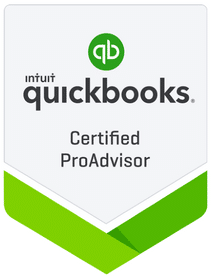- Patrick Roney
- (877) 503-8607
Follow Us :
Follow Us :
Proledge
September 30, 2024
Regarding the financial situation of your company, choosing to work with a full-time accountant or QuickBooks Bookkeeper in San Antonio will be absolutely vital. Though their cost structures and benefits differ, both choices provide worthwhile services. Knowing these variations will enable you to make a wise option that best uses your financial resources and guarantees effective meeting of accounting needs for your company.

Employing a full-time accountant carries some financial obligations. The compensation is the most visible expense; depending on experience and expertise, a trained accountant’s pay may go from $50,000 to $80,000 yearly. Still, this is only beginning. Usually needing perks including health insurance, retirement contributions, and paid time off, full-time workers can add extra 30-40% on top of the base pay. Small to medium-sized companies especially should pay close attention to these expenses since they can rapidly mount up.
Apart from pay and perks, one has other costs to take into account. Recruitment of a full-time accountant entails expenses linked to job ads, interviews, and background checks. Once employed, you will have to give the required tools so they may carry out their work efficiently. This covers accounting software, computer gear, and office space. Especially for a smaller company with limited resources, the first construction and continuous upkeep of this infrastructure can be expensive.
Moreover, one cannot ignore the time and money invested in running a full-time accountant. Beyond the cost, you will have to commit time to teach the new recruit the procedures and culture of your business. Dealing with their workload, performance reports, and maybe turnover adds still another level of difficulty. Although a full-time accountant can provide detailed financial monitoring, their salary expenses are significant.
Conversely, choosing to collaborate with a QuickBooks Bookkeeper in San Antonio might present a more reasonably priced solution without compromising quality. Usually charging by the hour or by project, a QuickBooks bookkeeper gives more freedom in handling costs. Hourly charges vary depending on the extent of labor from $30 to $70; some bookkeepers provide packages for continuous services. By allowing companies to scale their bookkeeping requirements depending on current financial demands, this pay-as-you-go approach helps them avoid the fixed costs related to a full-time hire.
Using a bookkeeper offers a major benefit in that it eliminates extra expenses such as infrastructure fees, paid time off, and perks. Most bookkeepers operate remotely or with their tools. Hence, you won’t have to make investments in office space or tools. QuickBooks bookkeepers also typically know the program well, which helps to save time and money by lowering the training needs. More simplified procedures resulting from this efficiency free your company to concentrate on expansion instead of administrative chores.
The degree of knowledge you obtain without the long-term financial commitment is another cost-related advantage. Many San Antonio QuickBooks bookkeepers specialize in helping small to medium-sized companies and providing focused solutions for your business sector. Making wise company decisions depends on accurate financial records and improved financial planning, which this specific expertise may help you produce. Moreover, the option to hire a bookkeeper on a part-time or as-needed basis helps you control expenses by paying just for the services you need.
You can contact us anytime if you have questions or encounter a problem with your bookkeeping program.
Although cost is a major consideration, one also has to take into account the advantages and constraints of any choice. Being totally integrated into your company, having constant support, and having a thorough awareness of your financial situation are benefits of being a full-time accountant. For companies with more sophisticated financial demands, they may manage difficult financial chores such as budgeting, forecasting, and compliance. Having someone on-site also guarantees faster reaction times and easier departmental cooperation.
A full-time accountant’s high cost, meanwhile, can be a drawback, particularly for smaller companies that might not call for such comprehensive services. Slower financial times can also be taxing, given the dedication to full-time pay and perks. Moreover, the hiring process can be time-consuming and expensive, and turnover constantly exists, thereby leaving your company without vital financial control for a protracted period.
By comparison, a QuickBooks Bookkeeper in San Antonio provides adaptability and specific knowledge in handling daily financial chores. This covers everything from running accounts payable and receivable to handling payroll. Growing companies from San Antonio or Austin find this option advantageous since it allows them to scale services up or down depending on their demands. The main drawback, though, is that a bookkeeper might not be able to manage more complicated financial plans or provide the same degree of strategic insight as a full-time accountant.
The best choice between a full-time accountant and a QuickBooks bookkeeper will finally rely on the particular requirements of your company. Analyze the intricacy of your financial activities first. A full-time accountant could be the ideal option for your company if it has sophisticated financial needs—such as regular audits, complicated tax filings, or in-depth financial research. For bigger or more sophisticated companies, they can provide strategic financial planning and complete support.
On the other hand, a QuickBooks Bookkeeper in San Antonio could be the more affordable option if your financial requirements are simpler and mostly consist of keeping accurate records, processing payroll, and handling invoicing. Small to medium-sized companies, like family businesses, that need flexibility and the capacity to better control expenses should especially find this true. Think about how much time you spend on financial chores and whether a bookkeeper could effectively handle them to enable you to concentrate on expanding your company.
Another important factor is your budget. Analyze costs to find the best value for your company among the several choices. Consider not only the direct hiring expenses but also the indirect ones, such as the time you will have to spend supervising an employee instead of an outsourced bookkeeper. Carefully balancing these elements will help you decide which supports your company’s expansion and fits your financial objectives. Our services page provides further ideas on handling company funds.

Ultimately, both a QuickBooks Bookkeeper in San Antonio and a full-time accountant provide useful services to enable your company to flourish. Still, the ideal option will rely on your particular requirements, degree of financial complexity, and budget. Though they have more expenses and long-term obligations, a full-time accountant offers complete financial management. Conversely, a QuickBooks bookkeeper is a great fit for companies trying to maximize their financial management free from the overhead of a full-time staff since they provide flexibility, specialized knowledge, and cost savings. Contact us if you want to investigate how a QuickBooks bookkeeper might help your company.


Fill out the form below to sign up to our Blog Newsletter and we’ll drop you a line when new articles come up.

For many business owners, taking care of their business is like taking care of a baby. If you want a successful business, you need to always pay attention to the

Bookkeeping and accounting are words that are used interchangeably by most people. It’s true that both of these are about the financial management of your business, but in different ways.

It’s that time again! The tax season is slowly but surely coming to an end and that means you can’t postpone it anymore. You’ve got to figure it out. We

There are lots of businesses that need to find efficient ways to keep track of their finances nowadays, and if you are a business owner, you have experienced this first-hand.

As we all know, automated means of running your business have started to become very popular recently due to all of the perks that it provides. This is not to

So you’re at that point in developing your small business where you’re looking into accounting solutions. If so, you might have started to wonder what’s the best bookkeeping software for
ProLedge is a bookkeeping services firm.
Copyright © 2024 All rights reserved.